Abit AT8: µGuru comes to the RD480
by Gary Key on March 10, 2006 12:05 AM EST- Posted in
- Motherboards
Audio Performance
The Realtek ALC-882D HD audio codec was tested with the recently released 1.31 driver set. The Realtek DirectSound audio drivers do not support more than 32 hardware buffers and the OpenAL 1.1 drivers do not support more than 30 hardware buffers at this time, so the scores cannot be directly compared to the HDA Mystique 7.1 and Creative Labs Sound Blaster X-FI cards in the benchmarks. The Realtek OpenAL 1.1 driver increases CPU utilization up to 21% more than the Realtek DirectSound drivers in the 3D tests.
However, if you are a serious gamer, then a dedicated sound card is still a requirement to ensure consistent frame rate averages across a wide variety of games. We noticed in previous testing of our Battlefield 2 and Half Life 2 benchmarks, the Realtek HD audio codec would cause stuttering in intensive scenes. The 1.31 driver release has now eliminated all stuttering in our current benchmarks while improving performance across the board except in Serious Sam II. We did not notice the same performance degradation in Serious Sam II with the 1.31 driver set and the Realtek ALC-882 codec on the Intel chipset boards. We are still investigating this issue.
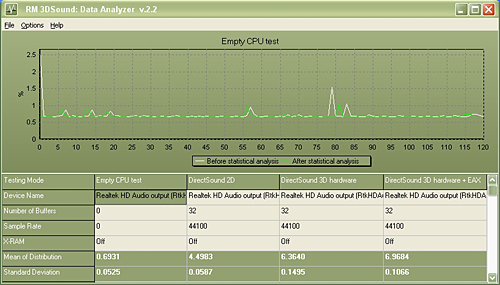
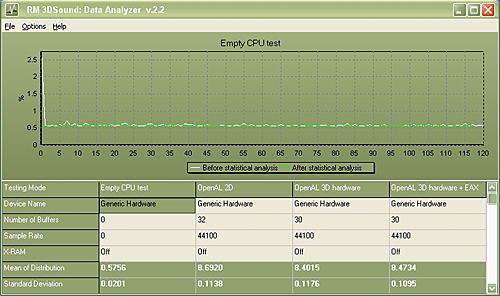
The Realtek ALC-882D HD audio codec was tested with the recently released 1.31 driver set. The Realtek DirectSound audio drivers do not support more than 32 hardware buffers and the OpenAL 1.1 drivers do not support more than 30 hardware buffers at this time, so the scores cannot be directly compared to the HDA Mystique 7.1 and Creative Labs Sound Blaster X-FI cards in the benchmarks. The Realtek OpenAL 1.1 driver increases CPU utilization up to 21% more than the Realtek DirectSound drivers in the 3D tests.

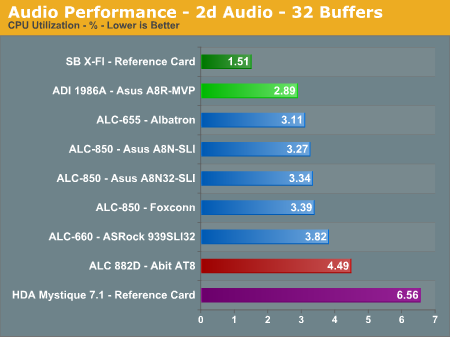
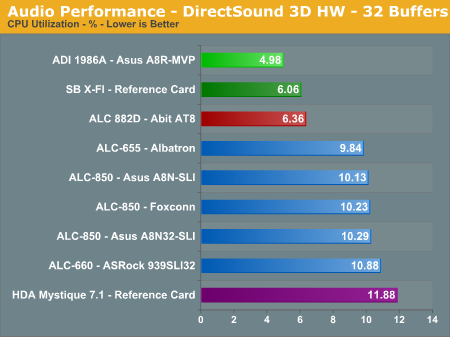
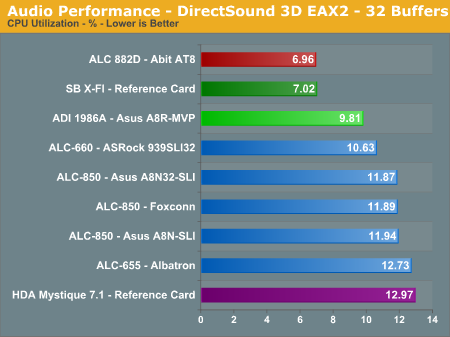
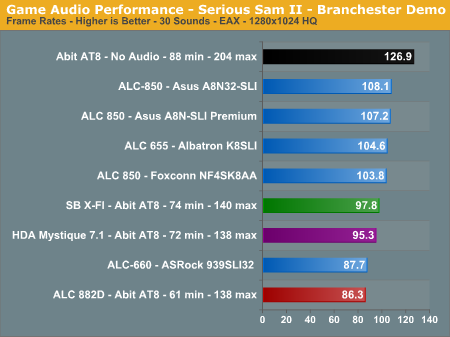

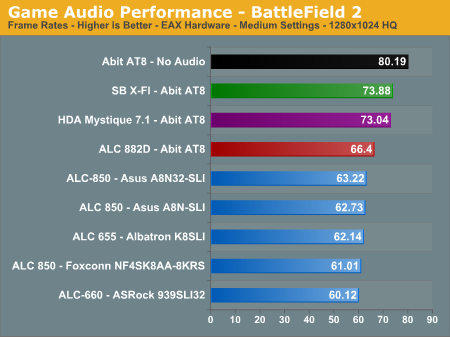

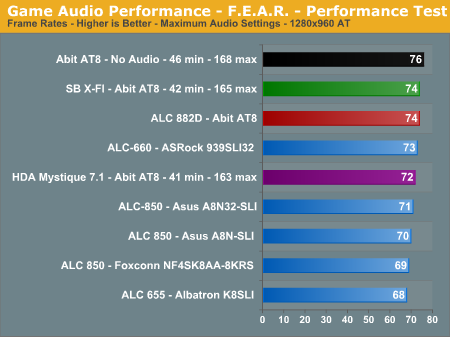
However, if you are a serious gamer, then a dedicated sound card is still a requirement to ensure consistent frame rate averages across a wide variety of games. We noticed in previous testing of our Battlefield 2 and Half Life 2 benchmarks, the Realtek HD audio codec would cause stuttering in intensive scenes. The 1.31 driver release has now eliminated all stuttering in our current benchmarks while improving performance across the board except in Serious Sam II. We did not notice the same performance degradation in Serious Sam II with the 1.31 driver set and the Realtek ALC-882 codec on the Intel chipset boards. We are still investigating this issue.










42 Comments
View All Comments
FireTech - Monday, April 10, 2006 - link
Status Update - Revised 1.1 BiosAbit provided us a revised 1.1 bios tonight (3-9-06) for additional testing and it will be available on Abit's website shortly. We will update the article after our regression testing is completed.
Hi Gary, it would be great if you could please do that promised follow-up review update for the AT8 especially now the AT8 32X is out. It has beeen a while since the initial review and so things should have settled down now or possibly even a new 'beyond 1.1' beta BIOS has been produced for you?
Please update this review and maybe have a follow up on all the Crossfire boards you have reviewed. There seem to be quite a few owners talking on various forums who bought on the strength of these reviews and are relying on you to get things moving on the manufacturer support front...
I'm personally just waiting to see if the AT8 can be the board it was advertised to be before I take the plunge. Why buy into trouble if you don't need to, I've done the 'early adopter' thing too often already?
Gary Key - Monday, July 3, 2006 - link
We are still seeing issues with Infineon based memory that is set to 2-3-2-5 in the SPD, the board will not boot. If your memory utilizes these IC chips, the only choice you is to install some Samsung TCCD, boot the board, manually change the CAS to 2.5, reboot, shutdown, install the other memory, and boot again. Hopefully, Abit will do another bios spin, otherwise, you are left with this hack.Zoomer - Tuesday, March 21, 2006 - link
Wish you could plug abit's use of the 882D more, it seems to be an excellent realtek chipset. It matches the x-fi in the 3d rightmark tests and is competitive with it even in games. Excellent job!Another thing: Could you guys do some objective listening tests to the audio output? Blind A/B switches between the HDA and onboard audio using good quality speakers and/or headphones will be welcome. :)
Gary Key - Friday, March 24, 2006 - link
Our next step in audio testing, besides subjective remarks, will be doing objective audio tests (besides sampling output from RMAA 5.5) on each new codec implemented on a board. We are still deciding how to do this and my personal preference is to provide a download link to a high quality audio output file from each codec tested. These files would be a standardized clip from a music selection, movie scene, and game sequence. The question is if we will receive permission from the involved parties to allow distribution and obviously what choice of equipment to utilize for the audio capture without distorting the file before playback through the on-board codec or discreet card. Something on the list to do besides new creating new benchmarks also....... :)
Zoomer - Saturday, March 25, 2006 - link
Oh sorry, I meant to say subjective blind listening tests. But that might be a good idea too. To avoid licensing issues, you could use public domain music. However, the quality of the client output hardware and the recording method used would taint results.Duplex - Friday, March 24, 2006 - link
A suggestion to develop the audiotest is that you measure 1. the latency from input(ad) to "software" and 2. from input(ad) to "software" to output(da) with or without some well defined effect applied.Realtek: We don't support ASIO & GSIF directly in our driver.
For ASIO, there is an "universal ASIO driver for WDM audio" available on ASIO4ALL. Please refer to http://www.asio4all.com">http://www.asio4all.com. It is free for end-users.
Zoomer - Tuesday, March 21, 2006 - link
If I am reading it correctly, you are saying the primary slot is the 4th from the cpu, or in the middle of the board and will cover 1 pci slot when used.If that is correct, I suspect this will be a deal breaker for many. It effectively transforms the board to having 1 PCI slot or even none at all, and 2 usable but useless pcie slots, 1 1x and another 8x.
Gary Key - Friday, March 24, 2006 - link
Yes, the primary x16 slot is the lower x16 slot on the board. If you use a X1900XT (dual slot card) as an example you will render the PCI slot next to it useless.
Zoomer - Saturday, March 25, 2006 - link
Well, I think it was a bad decision on abit's part. Why leave the top part of the board free while overcrowding the bottom? End users are suffering from these strange board design because of nvidia's SLI now.PS: Yes, I do think SLI is a terribly bad idea.
Operandi - Sunday, March 12, 2006 - link
Excellent review I particularly liked the coverage on the fan control, good work.